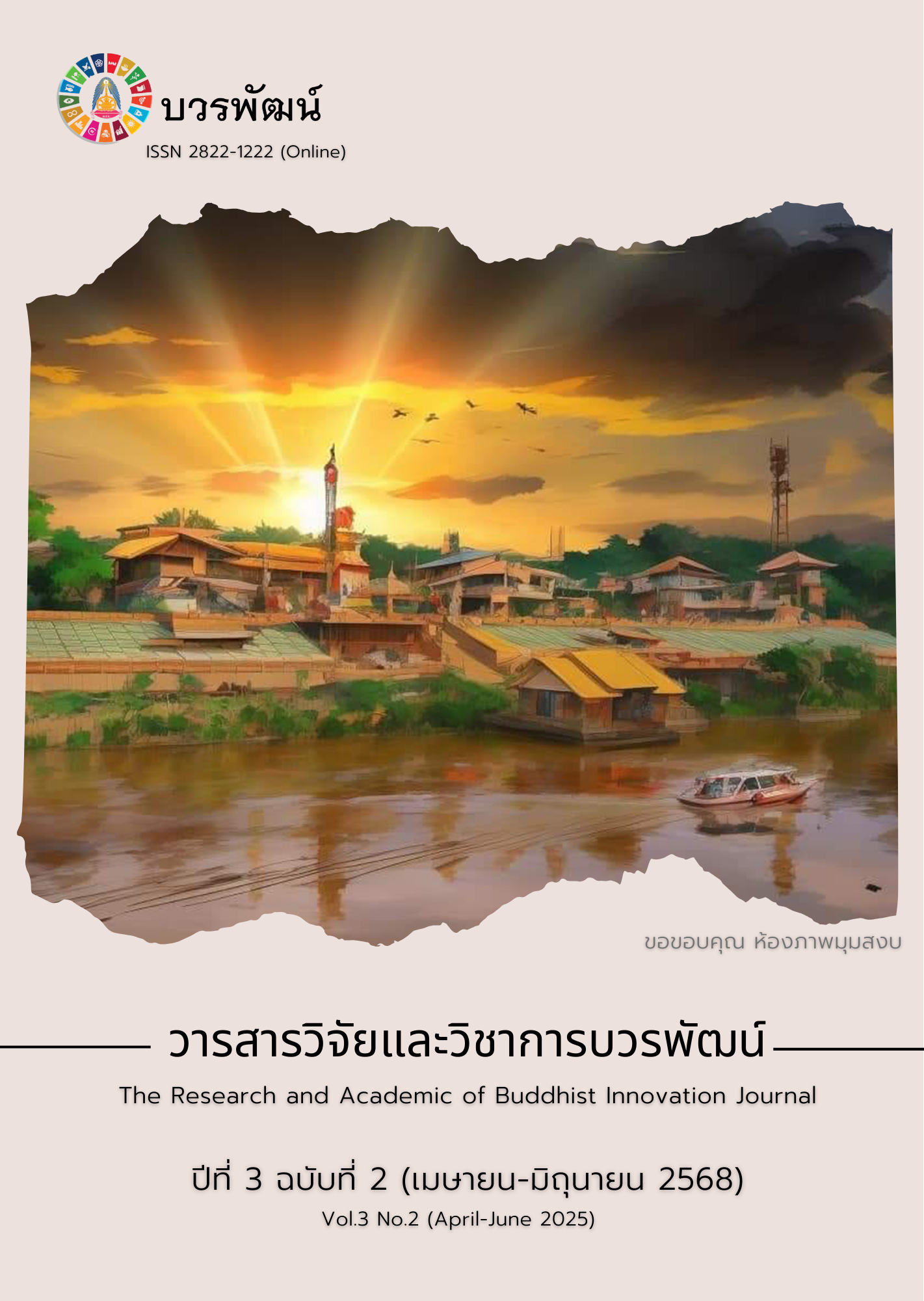Social Studies Teaching Models in the Next Normal Era
Main Article Content
Abstract
This academic article aims to study the teaching models of social studies in the Next Normal era. It was found that after the global crisis, in the case of the COVID-19 pandemic, educational institutions must prepare to adjust their way of life to be in line with the situation of the spread of new infectious diseases. Because when there was an outbreak of the disease, it often affected life after this, especially causing students to not go to school. When students learnt at home, teachers should use the awareness that has arisen to design teaching and learning management to respond to students' learning and meet the educational models in the Next Normal era, including classroom learning, blended teaching models, and phenomenon-based teaching models. In this regard, teachers who play a very important role in education in the Next Normal era, must prepare themselves to be ready in terms of knowledge and learning management design. In the Next Normal era, learning management design should focus on giving students life skills and being able to adapt to the current situation. Teachers should create students to be innovators who have deep, solid, and durable knowledge, namely being a person who truly knows, clearly understands, and can apply it to create future innovations.
Article Details

This work is licensed under a Creative Commons Attribution-NonCommercial-NoDerivatives 4.0 International License.
1. เนื้อหาและข้อมูลในบทความที่ลงพิมพ์กับวารสารวิจัยและวิชาการบวรพัฒน์ ถือเป็นข้อคิดเห็น และความรับผิดชอบของผู้เขียนบทความโดยตรงซึ่งกองบรรณาธิการวารสารไม่จำเป็นต้องเห็นด้วย หรือร่วมรับผิดชอบใด ๆ
2. บทความ ข้อมูล เนื้อหา รูปภาพ ฯลฯ ที่ได้รับการตีพิมพ์ในวารสารวิจยวิชาการ ถือเป็นลิขสิทธิ์ของวารสารวิจัยและวิชาการบวรพัฒน์ หากบุคคลหรือหน่วยงานใดต้องการนำทั้งหมดหรือส่วนหนึ่ง ส่วนใดไปเผยแพร่ต่อหรือเพื่อการกระทำการใด ๆ จะต้องได้รับอนุญาตเป็นลายลักษณ์อักษรจากวารสารวิจัยและวิชาการบวรพัฒน์ก่อนเท่านั้น
References
จินตวีร์ คล้ายสังข์. (2562). การพัฒนานวัตกรรมโมบายแอพลิเคชันสำหรับการเรียนรู้ในบริบทเสมือน เพื่อส่งเสริมทักษะการสื่อสารภาษาอังกฤษสำหรับผู้เรียนอุดมศึกษาในศตวรรษที่ 21. (รายงานการวิจัย). จุฬาลงกรณ์มหาวิทยาลัย : สำนักงานคณะกรรมการส่งเสริมวิทยาศาสตร์วิจัยและนวัตกรรม.
เชาวฤทธิ์ จงเกษกรณ์. (2565). การจัดการเรียนรู้วิชาสังคมศึกษาโดยใช้ปรากฏการณ์เป็นฐานสำหรับห้องเรียนแบบไฮบริด. ใน การประชุมวิชาการระดับชาติ “วิทยาลัยสงฆ์แพร่” ครั้งที่ 2. (น. 539-553). แพร่ : วิทยาลัยสงฆ์แพร่.
เทื้อน ทองแก้ว. (2563). การออกแบบการศึกษาในชีวิตวิถึใหม่ (Design- Based New Normal): ผลกระทบจากการแพร่ระบาด COVID-19. คุรุสภาวิทยาจารย์, 1(2), 1-10.
มูลนิธิคีนันแห่งเอเชีย. (2565). ผลกระทบจากโควิด 19 ด้านการศึกษา. เข้าถึงได้จาก https://www.kenan-asia.org/th/covid-19-education-impact/
วิจารณ์ พานิช. (2555). วิถีสร้างการเรียนรู้เพื่อศิษย์ในศตวรรษที่ 21. กรุงเทพฯ : มูลนิธิสดศรีสฤษดิ์วงศ์.
วิชัย วงษ์ใหญ่ และมารุต พัฒผล. (2563). การออกแบบการเรียนรู้ใน New Normal. กรุงเทพฯ : บัณฑิตวิทยาลัย มหาวิทยาลัยศรีนครินทรวิโรฒ.
สำนักงานคณะกรรมการสุขภาพแห่งชาติ. (2565). ค่านิยม “Next Normal” ลดเสี่ยงโควิด-19. เข้าถึงได้จาก https://www.nationalhealth.or.th/th/node/3011
สำนักงานส่งเสริมเศรษฐกิจดิจิทัล. (2565). Digital Transformation จาก New Normal สู่ Next Normal. เข้าถึงได้จาก https://www.depa.or.th/th/article-view/ digital-transformation-new-normal-next-normal
สุวิมล มธุรส. (2564). การจัดการเรียนรู้โดยใช้ปรากฏการณ์เป็นฐาน: การเรียนรู้แบบบูรณาการเพื่อส่งเสริม ความรู้ของผู้เรียนในโลกแห่งความจริง. วารสารบัณฑิตศึกษา มหาวิทยาลัยราชภัฏวไลยอลงกรณ์ ในพระบรมราชูปถัมภ์, 15(2), 251-263.
สุสัณหา ยิ้มแย้ม. (2558). การพัฒนาการจัดการเรียนรู้แบบผสมผสานเพื่อพัฒนาทักษะการเรียนรู้ในศตวรรษที่ 21. วารสารพยาบาลสาร, 42(พิเศษ), 129-140.
Mahavijit. (2017). Application on Phenomenon-based Learning and Active Learning in elementary education course to enhance 21st century learning skills. Journal of Education Khon Kaen University, 42(2), 73 - 90.
McKinsey. (2021). The Next Normal. Retrieved from https:/ /www.mckinsey.com/featured-insights/the-next-normal
Mishra, P. & Koehler, M. J. (2006). Technological Pedagogical Content Knowledge: A new framework for teacher knowledge. Teachers College Record, 108(6), 1017-1054.
Mission to the Moon. (2565). ก้าวผ่านจาก New Normal สู่ “Next Normal” ด้วย 4 เทรนด์หลักหลังยุคโควิด-19. เข้าถึงได้จาก https://missiontothemoon.co/ softskill-new-normal-to-next-normal/
Shulman, L. S. (1987). Knowledge and teaching: Foundations of the new reform. Harvard Educational Review, 57(1) 1-22.
Tissington, S. (2019). Learning with and through phenomena: An explainer on phenomenon-based learning. Paper presented at the Association of Learning Developers in Higher Education Northern Symposium, Middlesbrough UK.


